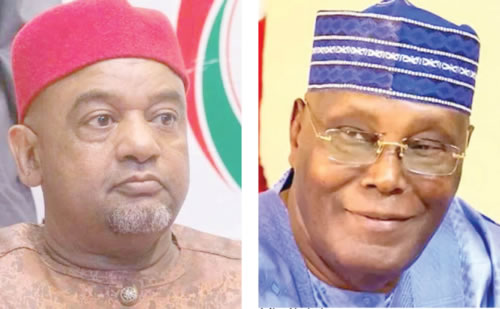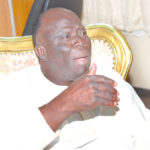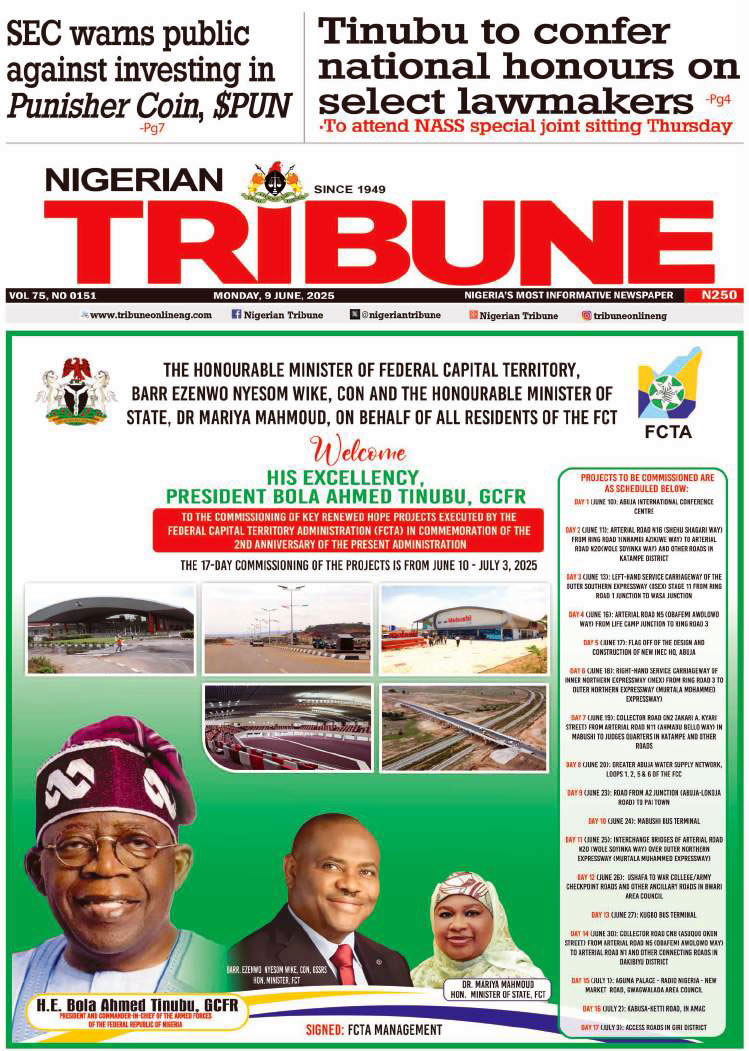Abuja Bureau Chief, LEON USIGBE, writes on the highs and lows of the Peoples Democratic Party (PDP) as it clocks 25 years.
August 31, 2023, marked the Silver Jubilee of the Peoples Democratic Party (PDP) but the day passed without as much as a whimper. No celebration. No ceremony. Not even the usual press conference for self-adulation for attaining the milestone as the once biggest political party to ever tread the landscape of Africa.
The PDP was formed in 1998 by the coming together of several individuals and groups led by the G-18 and then, the G-34, who were opposed to the continuation of military rule. Former Vice President. Alex Ekwueme was the founding national chairman, while former minister of information and national orientation, Jerry Gana, was the founding national secretary. The founders were intent on and succeeded in birthing a broad base political party, which was able to draw membership from a wide spectrum of the Nigerian society to become the dominant party of the era.
Founding principles
The PDP based its founding principles, which it has embedded in its constitution, on factors such as the fact that the right to freedom of association is an inalienable right of man; that organizing themselves into a political party will ensure that Nigerians participate fully in the politics of the country to sustain the country’s democracy; conscious of the need to share and rotate key political offices among the diverse peoples of Nigeria; determined to pursue the goals and aspirations of citizens in a manner consistent with best practices the world over; persuaded that the equitable distribution of power among the three tiers of government is a sure way of ensuring peace and harmony in the land; and believing that a strict enforcement of a code of conduct among members in and out of office will reduce corruption and ensure probity and accountability in the polity.
The founders were also prompted by a the conviction that the enthronement of a moral social order will result in the spiritual regeneration of the nation; recognizing that a well ordered political system is a sine qua non to economic and social development; conscious of the need to ensure the welfare of Nigerians within a sovereign and united country, and recognizing the need to defend and uphold the sanctity of Nigeria.
Elections
Having just been released from political detention, former military head of state, General Olusegun Obasanjo emerged as its first presidential candidate in the first presidential primary of the party in preparation for the scheduled February 1999 general elections. He picked Atiku Abubakar as his running mate and they won the presidential election with 18,738,154 or 62.78% of the total votes cast. The party also won the majority of the national assembly seats, clinching 206 of the 360 seats in the House of Representatives, 59 of the 109 seats in the Senate and 21 state governorship positions.
To assert its place as the dominant political party, the PDP also won the next general elections conducted in 2003. Obasanjo was re-elected with 24,456,140 or 61.94 of the total votes cast. It increased its chunk of the national assembly seats, garnering 223 seats in the House of Representatives seat and 77 in the Senate.
This streak of victories was stretched further in the 2007 general elections in which it featured the late Umaru Musa Yar’Adua as its presidential candidate and Goodluck Jonathan as his running mate. The party won the presidential election with 24,638,063 or 69.82% of the total votes cast, which remains the highest total for a presidential candidate in the nation’s democratic history.
The increased margin of victory was reflected in the national assembly election results which showed the PDP expanding its members of the House of Representatives to 262 and its senators to 85. President Yar’Adua had famously conceded that the election was not without flaws and committed to instituting electoral reforms.
But in 2011, the law of diminishing returns began to set into its fortunes. With Yar’Adua’s demise in office and the party presenting his successor, President Jonathan, it managed to retain power with 22,495187 or 58.89% of the total votes cast while its number in the House of Representatives dwindled to 203 and Senate, 71.
But the bubble finally burst for the party in 2015 as Jonathan tried to win a re-election. The PDP could only muster a total of 12,853,162 or 44.96 of the total votes to lose the election to the new opposition coalition of the All Progressives Congress (APC) led by Muhammadu Buhari. Since then, it has been an uphill struggle for the former ruling party whose stakeholders once boasted it would rule the country for 60 years.
Crises
The PDP is now contending with one egregious internal crisis or the other. Observers believe that letting the 25th anniversary go by without celebrating it is an indication of its current level of vapidity. It has lost its soul, its flavour; it has become insipid and living on its past glory. This is hugely different from the machine that bestrode the Nigerian political landscape like a colossus earlier in the present democratic dispensation.
However, while some of its critics have accused it of being a docile opposition since losing power in 2015, it continues to push back on such criticisms, seeking to present itself as the only hope for the suffering masses. This is the position it maintained in the only thing it did to remind Nigerians that it has clocked 25 years: a press statement on the day of the anniversary to recall its glory days and to highlight the deficiency of the ruling party.
Achievements
The PDP maintains that eight years the APC has spent in power have eroded the gains made by the country under the main opposition’s 16 years of governance just as the ruling party’s style of governance has become a threat to the country’s democracy and corporate existence. According to its national spokesperson, Debo Ologunagba, the PDP era brought about “the Nigerian golden years,” when it anchored its actions on the belief that power resides with the people. But this is fast fading because of corruption and the APC’s incompetence in government.
The PDP argues that it sustained focus on guaranteeing the rule of law, adherence to the principle of separation of powers, personal freedom of citizens, a free Press, credible electoral process, liberalization of the economy, vast infrastructural development, massive employment, and business opportunities, among other initiatives.
Ologunagba recalled some of its achievements. “It is on record that the PDP administration, through deft management of the economy, achieved $18bn debt relief from the Paris and London Clubs, consolidated the banking sector, revolutionized the telecommunication sector, revamped the oil and gas, manufacturing, aviation, agriculture, real estate and other critical sectors to turn the inherited moribund economy into one of the fastest growing in the world and handed over a $550 billion economy (largest in Africa and 26th globally) in 2015 to the APC.
“Under the PDP’s result-oriented leadership, our Foreign Direct Investment (FDI) grew to over $8b; our Foreign Exchange Reserves grew from $2bn in 1999 to over $40bn in 2014. Today, under the incompetent and corrupt APC administration our FDI plummeted to $0.19bn in 2022. The APC government had remained silent to reports by JP Morgan that Nigeria’s Foreign Exchange Reserves had fallen to $3.7bn as at the end of December 2022.
“The PDP administration guaranteed a stable economy that boosted domestic and international investors’ confidence in all sectors, grew the Nigeria Stock Exchange into one of the most profitable in the world, achieved food security through massive investment in agriculture with increased purchasing power of citizens which ranked Nigeria as a major development hub with Fitch BB rating under the PDP administration.
“Sadly, all the gains achieved by the PDP have been rolled back by the APC, which in a space of eight years, wrecked our economy and turned our nation into the poverty capital of the world with frightening 35% unemployment rate, where hunger, starvation, strange diseases, and sudden deaths now ravage our citizens.
“Under the vicious, corrupt, and incompetent APC’s watch, major multinational companies are exiting Nigeria; the Naira has fallen from N197 to US$1 under the PDP to abysmal over N900 to US$1; petrol which sold at N87 per litre by 2015 now sells for over N600 per litre. This is in addition to multiple harsh tariffs, taxes and levies imposed on citizens by the APC administration.
“Life in Nigeria under the APC has become very unbearable such that Nigerians are now resorting to suicide and slavery mission abroad as options. The fraudulent APC administration has succeeded in mortgaging the future of our nation with reckless accumulation of N85 trillion foreign debt with no corresponding development project to show for it. Typically, the APC has no answer to allegations that bulk of the borrowed funds were looted by APC leaders. It has also not provided answers to the alleged looting of over N20 trillion, including fuel subsidy funds by its leaders.
“While the PDP established the EFCC, ICPC and fought corruption, the APC adopted corruption as a state policy where government agencies have become Automated Teller Machines (ATM) of APC leaders and their cronies. This corroborates Transparency International (TI)’s rating of Nigeria as the most corrupt West African Nation and ranking 150 out of 180 in the World Corruption Perception Index under the APC.”
Ologunagba also affirmed that that the PDP succeeded in containing terrorism to the fringes by 2015 “only for the APC to import terrorist elements and bandits into the country, as confessed by one of its leaders, to assist the APC to violently rig the 2019 general elections”
“Nigerians can recall how APC leaders openly romanced and even paid money to the terrorists ravaging our country. Our nation now ranks as one of the highest in the World Terrorism Index with more than 20,000 citizens reportedly killed under the APC watch since 2015. The APC came to power by the instrument of lies and propaganda and seeks to sustain its hold with violence, intimidation, manipulations, and election rigging,” he added.
Despite its ongoing woes, the PDP sees itself as a government-in-waiting and makes the point to Nigerians that there is the need to be optimistic in the future of the country because it believes that it will bounce back and lead the charge for a country where the will of the people prevails.
READ ALSO FROM NIGERIAN TRIBUNE







